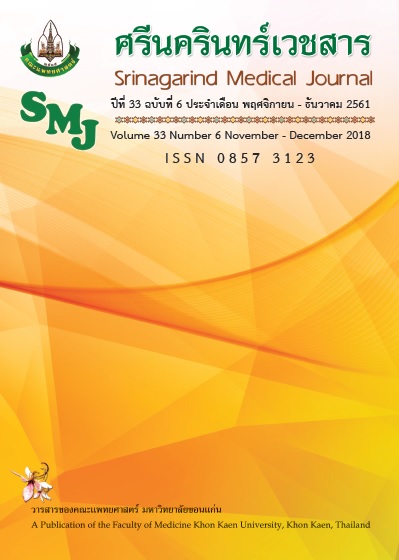Effect of Protein Hydrolysate Type A-2 from Pigmented Rice on Memory Deficits in A-injected rats
Keywords:
-amyloid; Protein hydrolysate; Recognition memoryAbstract
Background and Objective : Bioactive food-derived peptides possess the ability to promote wellness or reduce the risk of diseases. The natural antioxidants have been proposed as alternative therapeutic agents for Alzheimer’s disease. It also has been reported that pigmented rice (Oryza sativa L.) is a natural antioxidants. Therefore, The present study aimed to determine the neuroprotective effect of protein hydrolysate type A-2 from pigmented rice against b-amyloid (Ab) injected rats.
Methods : Male adult Wistar rats were orally given aqueous protein hydrolysate type A-2 extract of pigmented rice (HPR) at various doses ranging from 10, 20, and 40 mg/kg BW for 9 weeks. At day 56, Ab25-35 was injected via both sides of lateral ventricles. After 10 days of Aβ injection, rats were tested for cognitive performance using Novel object recognition tasks.
Results : Aβ25-35 obviously exhibited cognitive deficits by decreasing the discriminative index. When compare to the V plus Ab group, HPR20-, HPR40-treated rats showed a significantly higher discriminative index during 5 minutes and 24 hours delay testing phase, reflecting the increase of learning, short-term and long-term recognition memory of HPR type A-2.
Conclusions : These findings do provide initial evidence that HPR type A-2 may be benefit to be used for
neuroprotective effect.
References
2. Kannan A, Hettiarachchy N, Narayan S. Colon and breast anti-cancer effects of peptide hydrolysates derived from rice bran. The Open Bioactive Compounds Journal 2009; 2: 17-20.
3. Hatakeyama E, Yamaguchi M, Muramoto K, Ito G, Motohashi Y, Higuchi S. A brain science-based study of the effects of soy protein and peptide on human learning, memory and emotion. Soy Protein Research 2003; 6: 147-52.
4. Hu C, Zawistowski J, Ling W, Kitts DD. Black rice (Oryza sativa L. indica) pigmented fraction suppresses both reactive oxygen species and nitric oxide in chemical and biological model systems. J Agric Food Chem 2003; 51: 5271-7.
5. Sereewatthanawut I, Prapintip S, Watchiraruji K, Goto M, Sasaki M, Shotipruk A. Extraction of protein and amino acids from deoiled rice bran by subcritical water hydrolysis. Bioresource Technology 2008; 99: 555-61.
6. Zhang MW, Zhang RF, Zhang FX, Liu RH. Phenolic profiles and antioxidant activity of black rice bran of different commercially available varieties. J Agric Food Chem 2010; 58: 7580-7.
7. Pannangrong W, Wattanathorn J, Muchimapura S, Tiamkao S, Tong-Un T. Purple rice berry is neuroprotective and enhances cognition in a rat model of Alzheimer's disease. J Med Food 2011; 14(7-8): 688-94.
8. Lin HB, Yang XM, Li TJ, Cheng YF, Zhang HT, Zu JP. Memory deficits and neurochemical changes induced by C-reactive protein in rats: implication in Alzheimer’s disease. Psychopharmacology (Berl) 2009; 204: 705-14.
9. Nillert N, Pannangrong W, Welbat JU, Chaijaroonkhanarak W, Sripanidkulchai K, Sripanidkulchai B. Neuroprotective Effects of Aged Garlic Extract on Cognitive Dysfunction and Neuroinflammation Induced by -Amyloid in Rats. Nutrients 2017; 9: e24.
10. Thorajak P, Pannangrong W, Welbat JU, Chaijaroonkhanarak W, Sripanidkulchai K, Sripanidkulchai B. Effects of Aged Garlic Extract on Cholinergic, Glutamatergic and GABAergic Systems with Regard to Cognitive Impairment in A-Induced Rats. Nutrients 2017; 9: e686.
11. Kim JS, Lee HJ, Kim JC, Kang SS, Bae CS, et al. Transient impairment of hippocampus-dependent learning and memory in relatively low-dose of acute radiation syndrome is associated with inhibition of hippocampal neurogenesis. J Radiat Res 2008; 49: 517-26.
12. Antunes M, Biala G. The novel object recognition memory: neurobiology, test procedure, and its modifications. Cog Process 2012; 13: 93-110.
13. Ennaceur A, Delacour J. A new one-trial test for neurobiological studies of memory in rats. 1: Behavioral data. Behavl Brain Res 1988; 31: 47-59.
14. Jessberger S, Clark RE, Broadbent NJ, et al. Dentate gyrus-specific knockdown of adult neurogenesis impairs spatial and object recognition memory in adult rats. Learn Mem 2009; 16(2): 147-54.
15. Delobette S, Privat A, Maurice T. In vitro aggregation facilities beta-amyloid peptide-(25-35)-induced amnesia in the rat. Eur J Pharmacol 1997; 319: 1-4.
16. Yamaguchi Y, Kawashima S. Effects of amyloid-beta-(25-35) on passive avoidance, radial-arm maze learning and choline acetyltransferase activity in the rat. Eur J Pharmacol 2001; 412: 265-72.




